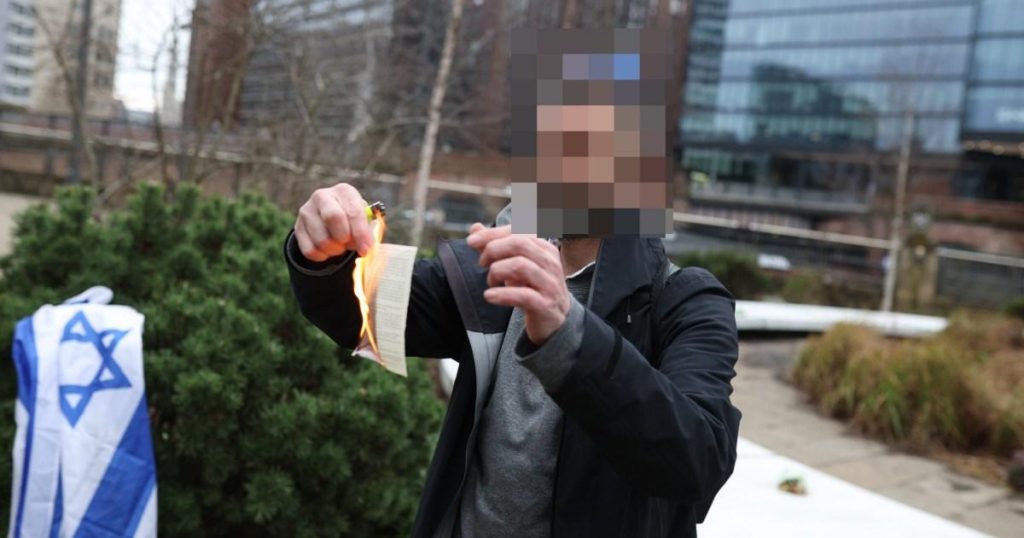The Desecration of a Sacred Text: A Man’s Act of Protest and Its Repercussions
Martin Frost, a 47-year-old resident of Stretford, Greater Manchester, found himself at the center of a controversy after publicly burning pages of the Quran, Islam’s holy book, and livestreaming the act on social media. This incident, which took place near the Glade of Light memorial commemorating the victims of the 2017 Manchester Arena bombing, sparked outrage and condemnation from the Muslim community and beyond. Frost’s actions, perceived as a deliberate act of blasphemy, highlighted the delicate balance between freedom of expression and the protection of religious sensitivities.
The incident unfolded as Frost, surrounded by a group of supporters, tore pages from the Quran before setting them alight. He punctuated his actions with inflammatory remarks, proclaiming his disdain for the Islamic faith and its place in society. His actions were further aggravated by his display of an Israeli flag, suggesting a potential link between his act and the ongoing Israeli-Palestinian conflict. A passerby, deeply offended by the desecration, attempted to intervene, only to be met with further hostility from Frost.
Following his arrest, Frost appeared before the Manchester Magistrates Court, where he pleaded guilty to a racially aggravated public order offense. The court heard that Frost’s actions were triggered by the recent death of his daughter in the Israeli conflict, a loss that had profoundly impacted his mental health. While acknowledging the personal tragedy that may have contributed to his actions, the court emphasized the gravity of his offense, stressing the importance of respecting religious sensitivities in a tolerant society.
The burning of the Quran is considered a deeply offensive act by Muslims, who revere the book as the literal word of God. For them, the act represents not just an attack on a physical object but a direct assault on their faith and beliefs. The victim impact statement delivered by the Muslim passerby who attempted to intervene captured the profound emotional distress caused by Frost’s actions. The witness described feelings of shock, disgust, and heartbreak, emphasizing the deep spiritual significance of the Quran within the Muslim community.
Frost’s defense attorney, Zoe Earle, acknowledged the distress caused by her client’s actions and highlighted his remorse. She emphasized Frost’s deteriorating mental health following his daughter’s death, suggesting that this personal tragedy played a significant role in his actions. The court, while acknowledging Frost’s personal circumstances, stressed that such actions could not be tolerated in a society that values tolerance and respect for religious diversity.
The incident also drew parallels to a similar act in Sweden earlier in 2023, where an anti-Islam activist was shot dead during a livestream after burning a Quran. Frost admitted to being inspired by this act, further highlighting the potential for such acts to incite violence and escalate tensions. This incident underscores the complex interplay between freedom of expression, religious sensitivities, and the potential for extremist acts to inspire further acts of violence.
The court, presided over by Judge Margaret McCormack, acknowledged the sensitive nature of the case, balancing Frost’s personal circumstances with the gravity of his offense. While expressing sympathy for Frost’s loss, the judge underscored the importance of respecting religious beliefs and maintaining social harmony. She emphasized that while tolerance is a cornerstone of British society, such acts of deliberate religious offense would not be condoned. Judge McCormack adjourned sentencing, ordering a pre-sentence report to be compiled. Frost was released on bail under the condition that he refrains from posting further inflammatory content on social media.
This incident highlights the ongoing tension between freedom of expression and the protection of religious beliefs. While individuals have the right to express their views, even those considered offensive by some, this right must be balanced against the need to protect individuals and groups from harassment and discrimination. The deliberate desecration of a sacred text, particularly in a public and provocative manner, crosses the line from protected speech to an act of hate that can incite violence and undermine social cohesion. This incident serves as a stark reminder of the need for dialogue, understanding, and respect for religious diversity in a pluralistic society.
The burning of the Quran, a deeply symbolic act, carries significant emotional weight for Muslims worldwide. The act represents not merely the destruction of a physical book but a profound disrespect for their faith and beliefs. The incident underscores the importance of understanding the cultural and religious context surrounding such acts, recognizing that freedom of expression should not be used as a shield for hate speech or actions that deliberately incite religious animosity. The court’s decision to proceed with a pre-sentence report reflects the complexity of the case, requiring a nuanced approach that considers both the individual’s circumstances and the broader impact of their actions on society.
The incident sparked widespread condemnation, with many emphasizing the need for respectful dialogue and understanding between different religious communities. The burning of the Quran served as a stark reminder of the potential for extremist acts to inflame tensions and undermine social cohesion. The court’s decision to impose bail conditions restricting Frost’s use of social media reflects the potential for online platforms to be used to spread hate speech and incite further acts of violence.
This case highlights the challenges faced by societies grappling with the complexities of freedom of expression and the protection of religious beliefs. While the right to express one’s views is a fundamental human right, this right must be exercised responsibly and with respect for the beliefs and sensitivities of others. The deliberate desecration of a sacred text crosses the line from protected speech to an act of hate, potentially inciting violence and undermining social harmony. The court’s decision to order a pre-sentence report demonstrates the need for a nuanced and considered approach to such cases, balancing individual circumstances with the broader societal impact of such acts.


